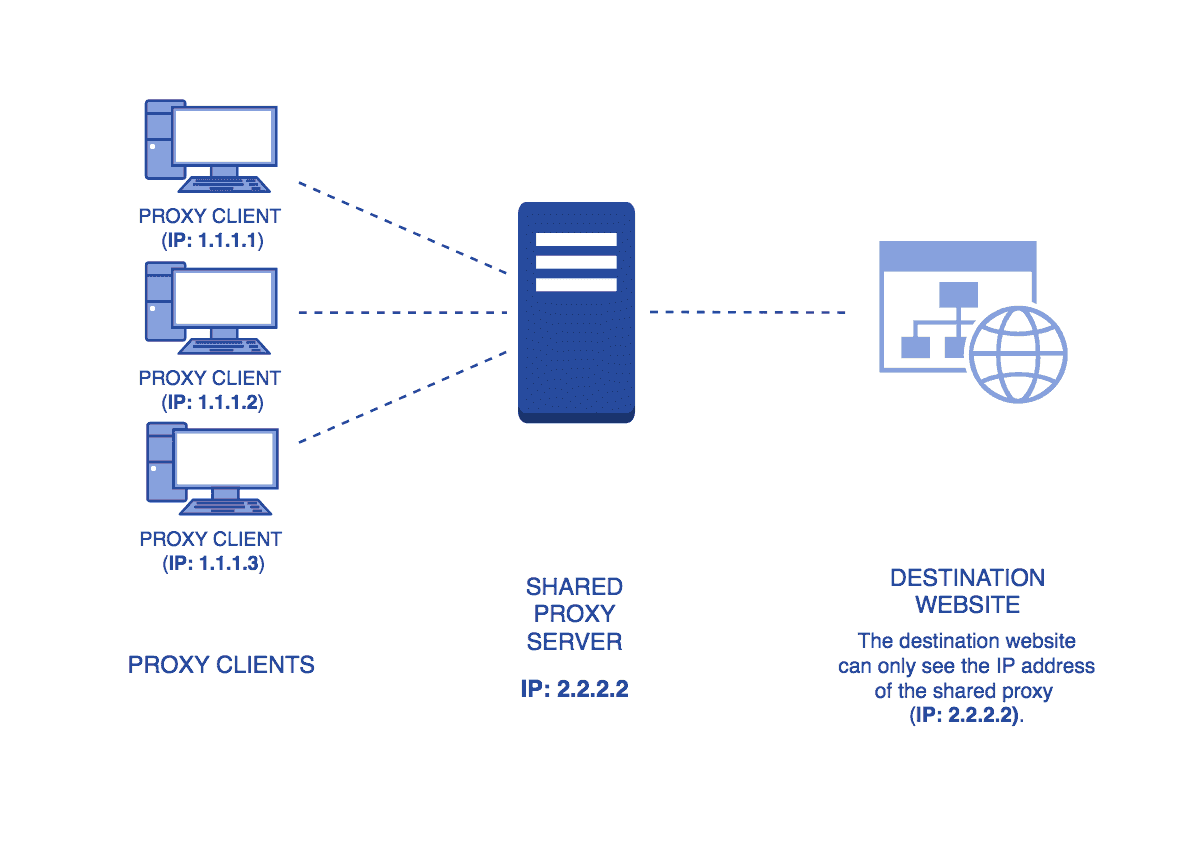Proxies are like specialized internet tools that act as intermediaries between your device and websites. Among different ways to categorize proxies, there are two groups that stand out: private and shared.
This guide will break down the key differences between private and shared proxies to help you choose the best fit for your online needs.
What is a Private Proxy?
A private proxy is a specialized proxy server that serves a single user at any given time, offering a unique blend of privacy, security, and performance enhancements over its public or shared counterparts.
When you use a private proxy, you’re given a unique IP address that’s yours alone. This drastically reduces the likelihood of encountering security issues or having your activities flagged for suspicious behavior, which is a common problem with shared IP addresses.
This exclusivity not only enhances your online privacy by ensuring your web activities can’t easily be tied back to you by others but also significantly improves your internet experience. Since the bandwidth is not divided among multiple users, you’re likely to enjoy faster loading times and smoother streaming or gaming experiences.
So, how do you choose the best private proxy? It depends on your specific requirements. Consider factors like control, security, performance, anonymity, and budget. If maximizing these aspects is essential for your online activity, selecting the best private proxy becomes even more critical
What is a Shared Proxy?
A shared proxy stands as a contrast to its private counterpart by serving multiple users simultaneously. This introduces both benefits and challenges into the web browsing experience.
By sharing an IP address with others, users can access the internet anonymously at a lower cost than private proxies, making shared proxies an appealing option for those with budget constraints or less stringent privacy needs.
However, this communal use can lead to slower internet speeds and potential security vulnerabilities, as the actions of one user can affect the reputation and accessibility of the proxy for everyone sharing it. For instance, if one user engages in activities that lead to the proxy being blacklisted, all users of that proxy might find themselves inadvertently blocked from certain websites or services.
Despite these risks, shared proxies remain popular for tasks that require anonymity but not the high level of security or the exclusive bandwidth provided by private proxies, such as basic web scraping or accessing geo-restricted content.
They offer a balance between affordability and functionality, allowing users to navigate the internet with a degree of anonymity and privacy without the higher costs associated with dedicated proxies.
The key difference between private and shared proxies lies in the level of control, security, and performance you get for your specific use case. Here’s a breakdown:
Use a Private Proxy If:
- High Control and Security are Crucial: You need complete control over the proxy’s configuration and bandwidth allocation. This is crucial for tasks like data scraping or sneaker copping where specific settings can optimize success rates. Additionally, the unique IP address minimizes the risk of getting blocked due to another user’s actions.
- Speed and Performance Matter: You require the fastest possible connection speeds. Since you’re the sole user, there’s no competition for bandwidth, leading to smoother streaming, faster downloads, and improved responsiveness.
- Privacy is a Top Priority: You value maximum anonymity online. The unique IP address ensures your online activities can’t be easily traced back to you. This is ideal for tasks like accessing geo-restricted content or protecting your browsing habits from prying eyes.
Use a Shared Proxy If:
- Cost is a Major Factor: Budget is a primary concern, and the lower cost of shared proxies makes them an attractive option.
- Basic Anonymity Suffices: You only need a basic level of anonymity for simple tasks like basic web scraping or occasional access to geo-restricted content where a unique IP isn’t essential.
- Understanding the Risks is Acceptable: You’re comfortable with the potential downsides of shared proxies, such as slower speeds due to shared bandwidth and the possibility of the IP getting blocked due to other users’ actions.
In essence:
- Private Proxy: Ideal for control, security, performance, and maximum anonymity (think high-performance tasks and sensitive browsing).
- Shared Proxy: Budget-friendly option for basic anonymity needs where speed and exclusivity aren’t critical (think occasional geo-restricted access or light web scraping).
How to Pick a Reputable Proxy Service?

- Research and Reviews: Start by researching potential providers. Look for companies with established track records and positive user reviews on independent platforms like Trustpilot or industry-specific websites.
- Transparency Matters: Choose providers who are transparent about their services. Look for details on proxy types (datacenter, residential, mobile), server locations, bandwidth limitations, and uptime guarantees.
- Security Considerations: Security should be a top priority. Opt for providers with robust security measures like encryption protocols and clear data privacy policies.
- Free Trials and Money-Back Guarantees: Many reputable services offer free trials or money-back guarantees. This allows you to test the service and ensure it meets your expectations before committing.
- Customer Support: Reliable customer support is crucial. Look for providers with responsive and knowledgeable support teams who can answer your questions and troubleshoot any issues you might encounter.
Wrapping Up: Choosing the Right Proxy for Your Needs
The world of proxies offers a spectrum of options, and understanding the distinction between private and shared proxies empowers you to make an informed decision.
For maximum control, security, blazing-fast speeds, and the ultimate anonymity, private proxies reign supreme. They cater to high-performance tasks, data-intensive operations, and situations where online privacy is paramount.
However, if budget is a concern and basic anonymity suffices for your needs, shared proxies present a cost-effective solution. They’re well-suited for occasional forays into geo-restricted content or light web scraping activities.



